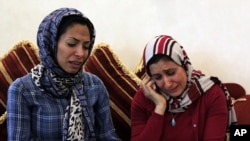MANAMA, Bahrain - In Manama, medical workers sentenced to prison for their role in last year's anti-government uprising have called on the international community to put pressure on authorities in the kingdom to overturn their convictions, insisting they are politically motivated.
A military court in Bahrain originally sentenced 20 activists - doctors and other health professionals - to prison terms ranging up to 15 years. An appeals court decision announced June 14 sharply reduced nine defendants' sentences, to a range between one month and five years, and reversed last year's guilty verdicts entirely for nine others.
The remaining two medical workers convicted in September did not join the appeal, and are believed to have fled Bahrain, a small island nation that adjoins Saudi Arabia.
Physician Ghassam Daif, whose sentence was reduced from 15 years to one year in prison, said Saturday he credits the easier treatment to pressure brought to bear on Bahrain from outside the country, but that all the charges should be dropped.
"I’m sure more continuous pressure from the international community will [result] in acquitting all the medics and clear up this case," he said.
The United States, for which Bahrain is an important ally in the Persian Gulf, said it was "deeply disappointed" that the kingdom's courts failed to overturn all the convictions.
Although the charges placed against the health workers were revised, authorities in the kingdom insist they should be punished for politicizing their profession, breaching medical ethics and for attempting to overthrow Bahrain's monarchy. Officials say the activist medical workers are not being punished for treating injured protesters during last year's demonstrations, or for any of their individual political views.
International rights groups say all the medics arrested last year should be acquitted on all charges, because they were tortured into giving false confessions. Bahrain’s deputy attorney general says the court did not base its verdicts on the confessions, but rather on witness testimonies and physical evidence.
Dr. Ali al-Ekry, who was given the longest revised sentence, five years, says the evidence against him and his colleagues, who are all Shi’ite Muslims, is bogus.
"It is all nonsense, baseless," he said.
The Bahrain Independent Commission of Inquiry published a report in November asserting that some health workers used their medical positions to advance activist causes, or to conceal their sentiments. The commission report said it was confirmed that Shi'ite staff at some Bahrain hospitals had turned away Sunni patients.
Shi'ites make up the majority of Bahrain's indigenous population, and they led last year's uprising, which among other things protested against the stranglehold on power and influence held by the country's Sunni minority.
The Bahrain government eventually suppressed the public uprising with security assistance from Saudi Arabia and the United Arab Emirates, but many Shi'ites say the notion that they are second-class citizens has never been dispelled.
The nine convicted medical workers said Saturday they will make a final appeal to Bahrain’s highest judicial body, the Court of Cassation.
A military court in Bahrain originally sentenced 20 activists - doctors and other health professionals - to prison terms ranging up to 15 years. An appeals court decision announced June 14 sharply reduced nine defendants' sentences, to a range between one month and five years, and reversed last year's guilty verdicts entirely for nine others.
The remaining two medical workers convicted in September did not join the appeal, and are believed to have fled Bahrain, a small island nation that adjoins Saudi Arabia.
Physician Ghassam Daif, whose sentence was reduced from 15 years to one year in prison, said Saturday he credits the easier treatment to pressure brought to bear on Bahrain from outside the country, but that all the charges should be dropped.
"I’m sure more continuous pressure from the international community will [result] in acquitting all the medics and clear up this case," he said.
The United States, for which Bahrain is an important ally in the Persian Gulf, said it was "deeply disappointed" that the kingdom's courts failed to overturn all the convictions.
Although the charges placed against the health workers were revised, authorities in the kingdom insist they should be punished for politicizing their profession, breaching medical ethics and for attempting to overthrow Bahrain's monarchy. Officials say the activist medical workers are not being punished for treating injured protesters during last year's demonstrations, or for any of their individual political views.
International rights groups say all the medics arrested last year should be acquitted on all charges, because they were tortured into giving false confessions. Bahrain’s deputy attorney general says the court did not base its verdicts on the confessions, but rather on witness testimonies and physical evidence.
Dr. Ali al-Ekry, who was given the longest revised sentence, five years, says the evidence against him and his colleagues, who are all Shi’ite Muslims, is bogus.
"It is all nonsense, baseless," he said.
The Bahrain Independent Commission of Inquiry published a report in November asserting that some health workers used their medical positions to advance activist causes, or to conceal their sentiments. The commission report said it was confirmed that Shi'ite staff at some Bahrain hospitals had turned away Sunni patients.
Shi'ites make up the majority of Bahrain's indigenous population, and they led last year's uprising, which among other things protested against the stranglehold on power and influence held by the country's Sunni minority.
The Bahrain government eventually suppressed the public uprising with security assistance from Saudi Arabia and the United Arab Emirates, but many Shi'ites say the notion that they are second-class citizens has never been dispelled.
The nine convicted medical workers said Saturday they will make a final appeal to Bahrain’s highest judicial body, the Court of Cassation.




